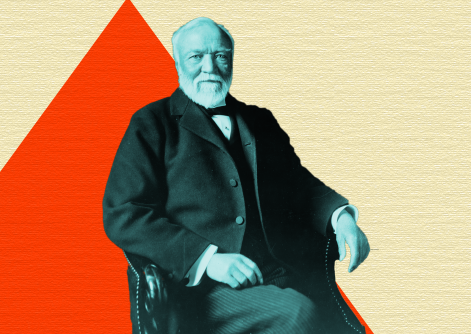Boy, was Jane Mayer of the New Yorker wrong about North Carolina’s donors and nonprofits. Before we look at the latest news from the Tar Heel state, recall that, after her famous attack on the Koch brothers, Mayer wrote a hit piece on donor Art Pope with the subhead, “A conservative multimillionaire has taken control in North Carolina.” An accompanying cartoon showed Pope – who has since been named the state’s deputy budget director – with a mountain of cash spilling out of one pocket and the state of North Carolina stuck in the other.
Though Mayer copiously catalogued donations by Pope and other conservatives, and the nonprofits they supported, she refused to explain that North Carolina's left-wing donors and activists outweigh their conservative counterparts in money, in number of groups, and especially in their nonprofits’ willingness to “advocate,” i.e., electioneer.
I’m proud of my rebuttal to Mayer’s dishonest piece; John Hinderaker of Powerline was kind enough to say,
Walter’s article was perhaps the most devastating refutation of a magazine article I have ever read. In a calm, dispassionate manner, he laid waste to Mayer to a degree that in a more just world would end her career in journalism.
But now I’ve been outdone. Civitas, a conservative group whose mere existence scandalized Mayer, has now described, twice over, how powerfully the Left fights in North Carolina, and just how far the Left will go in what it’s pleased to call “building the base of socially responsible voters.”
Mayer claimed to be shocked by Pope’s funding of Civitas:
Though Civitas is ostensibly nonpartisan, its sister organization, Civitas Action … is organized under a different part of the tax code, which allows it to sponsor hard-hitting election ads.
In other words, Civitas is a 501(c)(3) nonprofit that also has a (c)(4) arm, a practice so commonplace across the political spectrum it’s boring. It’s even a cliché for the (c)(4) to have “Action” in its name.
But now Civitas has its revenge.
The group has recently dug into two scandals in North Carolina, one involving voter registration and the other 501(c)(3) nonprofits that have gone far beyond any possible bounds of mere “advocacy” (which can be legal) into not-so-legal electioneering so harsh it would make a partisan hack blush.
Scandal #1
Let’s look first at the voter registration scam. Registering voters, of course, is a favorite activity of “advocacy” nonprofits, which claim they conduct registration in nonpartisan fashion.
Civitas discovered that in the recent election, when as always North Carolina forbade online voter registration, State Board of Elections (SBE) officials nonetheless helped groups connected to the Obama campaign register over 11,000 (and counting) persons by online means.
Read Civitas’s complete report. Here are some highlights:
● The SBE “coordinated with partisans behind closed doors, lied about the NC Attorney General’s Office concurring with the SBE staff on the issue, and dodged oversight by their own board and the legislature.”
● Forced to respond to Civitas, the SBE repeatedly denied it allowed online voter registration, eventually saying it had merely permited “‘web-based voter registration’ instead, as if there could be a ‘web-based’ process that wasn’t online.”
● The Pew Center on the States helped North Carolina’s executive branch officials confer with officials in states that had legalized online registration.
● The SBE general counsel wrote Civitas September 26, 2012, to assure them, “We were not contacted by any campaign, candidate, legislator, or political party” regarding registration. Yet the firm that SBE allowed to conduct “web-based” registrations brags on its website's front page that its clients include “Presidential campaigns,” and its clients page lists “Obama for President Draft Committee.”
● When SBE staff approved online registration, they knew the company they had OK’d to conduct it was used only by the Obama campaign (at GottaRegister.com) and by the left-of-center Rock the Vote (see this internal email Civitas obtained). The firm, Allpoint Voter Services, “uses remote-control pens to transmit ‘signatures’ over the Internet.” After a voter enters information in an online form, he “signs” it with a stylus or finger on his screen. Allpoint transmits the “signature” to an autopen in California or Nevada, which transcribes the signature on to a paper voter registration form. Allpoint then mails the document to local election boards.
● Except that Civitas found cases where, if a voter appeared to lean Republican, Allpoint did not mail the document but instead emailed the registrant a form that would then have to be printed out and mailed in.
● Federal Elections Commission data show the Obama campaign made 12 separate and differing payments to Allpoint from October 2, to October 24, 2012, which suggests the payments varied according to how many registrations Allpoint collected. North Carolina law forbids paying for voter registration. SBE says it never asked Allpoint if it received payment per registration.
● In mid-August 2012, the SBE had election officials from across the state attend its Annual Training for Election Officials. It never mentioned the new form of “web-based” registration to them.
● The next month, a county-level election official stumbled upon GottaRegister.com and objected to SBE that this was illegal; plus, “I didn’t hear anything about electronic registrations in NC being allowed” at the SBE conference held the previous month.
● A few days later, another county official complained to SBE he had received “a good number of registration forms from Allpoint,” all of whose signatures were “immediately suspect.”
● The following day, September 18, 2012, the SBE suddenly emailed all county election officials, telling them to expect this new kind of registration. More counties’ officials subsequently expressed grave concerns, especially over the “similarity of all the signatures.” One county compared a signature against the same voter’s DMV registration and found it didn’t match.
What’s the scope of this, uh, innovative approach to voter registration? Nationwide, over 100,000 online registrations in all 50 states were made by Allpoint this cycle, according to a politics and technology website. Civitas has officially requested registration records from all 100 North Carolina counties. Four of the ten most populous counties have yet to respond, and in three of those four, Democrats outnumber Republicans two to one. But with the limited data so far, Civitas’s count is already approaching 12,000 improper registrations, and the partisan breakdown is
68% Democratic
10% Republican
21 % unaffiliated
Now let’s compare that to the state as a whole:
43% Democratic
31% Republican
26% unaffiliated
In Mayer’s wildest nightmares, does she imagine Art Pope & Co. concocting a scheme to register voters by the thousands in a way that cuts the less-liked party’s representation by more than two-thirds and increases the preferred party’s representation by almost two-thirds? (and will left-wing groups in NC promise never again to claim they suffer from a “digital divide”?)
Scandal #2
North Carolina’s second current scandal involves leaked documents from the state’s sprawling left-wing nonprofit world, a world whose existence Mayer did her best to suppress. The Charlotte Observer broke this story a few days ago, after someone leaked documents from Blueprint North Carolina, a powerful left-wing collaborative that coordinates the work of dozens of politically active nonprofits.
Here’s how the IRS describes what a public charity may not do:
all section 501(c)(3) organizations are absolutely prohibited from directly or indirectly participating in, or intervening in, any political campaign on behalf of (or in opposition to) any candidate for elective public office … public statements of position (verbal or written) made on behalf of the organization in favor of or in opposition to any candidate for public office clearly violate the prohibition against political campaign activity.
Now here are selected tidbits from an elaborate, three-page memo that was leaked with other material from Blueprint North Carolina; it’s labeled “North Carolina 2013 Legislative Strategy: DRAFT”:
The most effective way to mitigate the worst legislation is to weaken our opponents’ ability to govern by crippling their leaders ([Gov.] McCrory, [House Speaker] Tillis, [Senate President Pro Tem] Berger, etc.).
Staff of video trackers follow the targets every move (McCrory/Tillis)….
Private investigators and investigative reporting: especially in the executive branch….
Pressure McCrory at every public event….
Some kind of tracking site like “XXX Days into the McCrory administration and still no jobs” or some ongoing ticker
Potential Two Year Vision: Eviscerate, Mitigate, Litigate, Cogitate and Agitate (“Lose Forward”)
Eviscerate the Leadership and weaken their ability to govern.
[Pay for] polling that identifies the weaknesses of our opponents….
Direct action [i.e., protests] at the legislature and other appropriate targets (Days of Action, etc.)
Organizers focus on year round voter registration….
Develop a core group to identify policy objectives that articulate our vision: if we controlled the legislature, what would we introduce? …This group feeds this to electeds and the earned media folks.
The memo was so embarrassing that the Z. Smith Reynolds Foundation, the leading and largest of North Carolina’s numerous left-of-center foundations, had to tell the Charlotte Observer it was “surprised and disappointed” by Blueprint North Carolina. (If you believe they were surprised, I’ve got a bridge to sell you.) The foundation’s executive director, Leslie Winner, said the foundation provides $400,000 of Blueprint’s less than $1 million budget. Winner added that the foundation
believes in robust debate on issues of public importance, [but it] does not support attacking people. We were disappointed to learn that Blueprint is advocating this strategy…. [I will talk to our attorney;] I don’t know whether it was improper under their tax-exempt status. I just know it was bad judgment.
Initially, the head of Blueprint did not disown the memo and told the Observer that “office holders, not office seekers are fair game.” The Observer had a hard time understanding how the memo squared with Blueprint’s claims on its website that it is
strictly prohibited from participating or intervening in any political campaign on behalf of or in opposition to any candidate for public office…. Blueprint activities will not be coordinated with any candidate, political party or other partisan entity.
After Z. Smith Reynolds expressed its concern, however, Blueprint’s head said that he “misunderstood” the Observer’s questions, that Blueprint did not send out the memo, and he “suggested it was appended to the other documents” – whose Blueprint origin he did not dispute – “by someone hoping to tarnish his organization.” After examining the materials, I’m willing to believe the memo was not part of the multi-document email Blueprint blasted out to all its nonprofit allies. But even when Blueprint’s head was distancing himself from the memo, he told the Observer that it was given to a meeting of over 50 “progressive” groups at a December meeting, which the memo says lasted two days.
As we go to press, America Votes, a 501(c)(4) nonprofit linked to George Soros, has claimed authorship of the memo. But Blueprint’s head still admits attending the December meeting where the memo was discussed; he just asserts, “only 501(c)(3)-compliant activities were discussed.”
If Jane Mayer wonders how the other side of North Carolina’s political debates operates, she should study the memo. I recommend she also peruse the documents Blueprint admits sending to the state’s left-wing network. One is a fancy (and expensive) “Key Messaging Points” presentation prepared by a national polling firm. It, too, is overtly attuned to personal political targeting; e.g., this directive: “Despite his winning the election, the jury is still out on McCrory, and now is the time for progressives to define him.”
Still not sure if this is electioneering? The Charlotte Observer points out that a paragraph from the pollsters’ work, distributed by Blueprint, “appeared verbatim in House Democratic Leader Larry Hall’s rebuttal to the governor’s State of the State address.”
The pollsters’ “messaging” is also full of truthiness. For instance,
Seven-in-ten voters (71 percent) believe that funding for North Carolina public schools has gone down in the past few years…. And, certainly, these perceptions should be readily applied to McCrory and his allies….
In fact, state funding for schools dipped in 2009-10 and 2010-11, but before that, funding had continually increased from 1992-93 onward. This school year the state will spend $590 million more than in 2010-11, with federal funding essentially unchanged.
And pardon me if I chuckle that the pollsters urge the Tar Heel Left to include in all their arguments appeals to “hard work” and “personal responsibility.” Another chuckle: When “framing support for Medicaid expansion,” you must sing the praises of “online insurance markets.” But when it’s time to manipulate the voters who don’t know the truth about the state’s education funding, you must attack efforts to allow “online charter schools.”
Then there are the pollsters’ findings on North Carolinians’ political philosophy:
Conservative 41%
Moderate 35%
Liberal 18%
Do you think Blueprint and its allies want the state’s policies to reflect those numbers? I think especially of “Democracy North Carolina,” which “uses research, organizing, and advocacy to increase voter participation.” Shouldn’t that “nonpartisan” 501(c)(3) re-name itself something more honest – say, the Democratic Party of North Carolina?
FOOTNOTE: Don’t miss Civitas’s reporting on a Raleigh-Durham media conglomerate whose TV and radio stations have reported on the Blueprint scandal without mentioning that the family who own the conglomerate have extensive ties to Blueprint and its allies, including seven-figure funding of them through the A.J. Fletcher Foundation. For more background on the many funders of these nonprofits, including George Soros and his Democracy and Power Fund, the Proteus Fund, et al., see my earlier response to Jane Mayer. The North Carolina GOP has filed complaints against Blueprint with the IRS and the State Board of Elections. Redstate reported on the scandal here, and Ron Nehring blogged on it here. He wisely pointed to the similar effort in Colorado by George Soros’ Democracy Alliance, as well as to Fred Barnes’ definitive analysis of that effort. Rick Cohen has an even-handed reported on the Blueprint story for Nonprofit Quarterly. (Disclosure: when I wrote my first post on North Carolina, I had no connection to Pope Foundation funding; now I'm at CRC, which has received funding.)






Responding to Tim S.:
I don’t understand why you say I didn’t name a source for the polls I quote. Before my first qt. from the polls, I write that I’m quoting “the documents Blueprint admits sending to the state’s left-wing network. One is a fancy (and expensive) ‘Key Messaging Points’ presentation prepared by a national polling firm.” Earlier, I gave a link to those documents — it’s http://www.wral.com/asset/news/state/nccapitol/2013/02/21/12136671/packet1.pdf
Second, you don’t seem to understand that House Democratic Leader Larry Hall did not “quote” a paragraph from the pollsters’ messaging memo; he plagiarized it, speaking the very words the pollsters had secretly urged the Left to use to maximize the chances their policies would be adopted.
Third, you say that I am “niave” (sic) to think even one (c)(3) exists that is “not partisan,” and that “being partisan is not the same thing as operating illegally.” Both claims are incorrect. Plenty of nonprofits simply don’t go near anything partisan or even politically ideological. And it most certainly is illegal to operate a (c)(3) as a partisan organization, as anyone in the sector should know, and as I quote from the IRS website. Such legal prohibitions explain why even Blueprint North Carolina takes the vow of nonpartisanship on its website that I quoted (however dubious their claim may be).
As for the broader point you seem to want to make, i.e., that nonprofits “working on social change” are likely to lean to a left or right ideology, that’s true, but it doesn’t change the fact that a (c)(3) public charity, and the donors who receive tax deductions for their support of it, should not violate the law’s limits on how such a group may translate its left or right ideology into political partisanship.
A thoughtful, compelling analysis of serious problems. Thank you for staying on this matter and educating us.
This article lacks some basic journalistic standards such as naming a source for quoted (yet uncredited) polls. Why can’t an elected leader quote a nonprofit, or vice versa? I don’t see the harm there. Are nonprofits not to be in touch with elected leaders?
And it seems niave that the author would think there are c3 nonprofits out there who are not partisan or that partisanship per se is taboo among nonprofits. How can one not be partial to a left or right ideology when working on social change? Being partisan is not the same as operating illegally. Or even unethically, unless you vow to be nonpartisan.